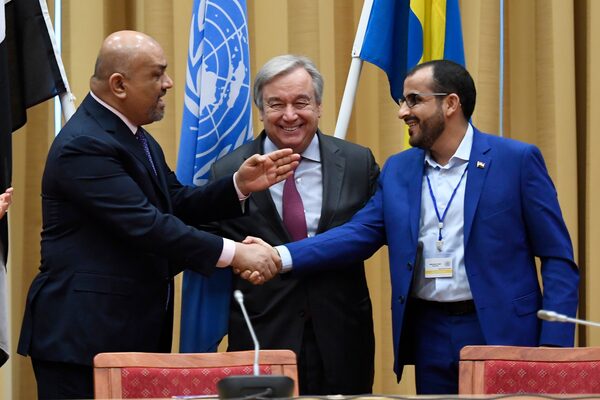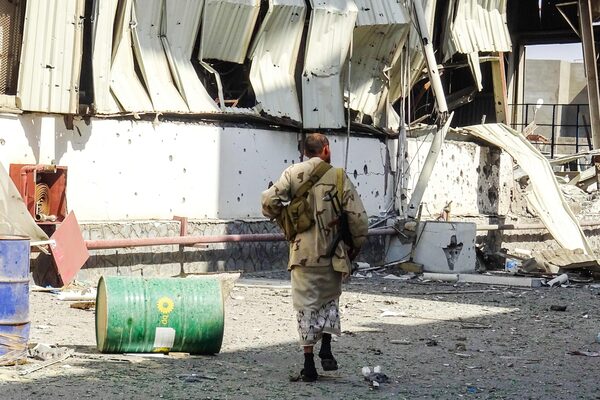A girl walks near her house destroyed in an air strike carried out by the Saudi-led coalition in Faj Attan village, Sanaa, Yemen, on Dec. 13, 2018.MOHAMED AL-SAYAGHI/Reuters
Yemen’s warring parties agreed on Thursday to cease fighting for the Houthi-held port city of Hodeidah and withdraw their troops, the first significant breakthrough for UN-led peace efforts in five years of conflict.
At the close of a week of talks in Sweden, UN Secretary-General Antonio Guterres said a framework for political negotiations would be discussed at the next round of talks at the end of January between the Iranian-aligned Houthis and the Saudi-backed government of President Abd-Rabbu Mansour Hadi.
Western countries, some of which supply arms and intelligence to the Saudi-led coalition that intervened in Yemen in 2015, had pressed the two sides to agree to confidence-building steps to pave the way for a wider truce and a political process to end the war, which has killed tens of thousands of people.
The conflict has pushed Yemen, the poorest country on the Arabian Peninsula, to the verge of famine. The World Food Program said the Hodeidah deal was a much-needed boost for its task of feeding 12 million severely hungry Yemenis.
The Houthis control most towns and cities, including the capital Sana’a, from where they ousted Mr. Hadi’s government in 2014. The government is now based in the southern port of Aden.
“You have reached an agreement on Hodeidah port and city, which will see a mutual redeployment of forces from the port and the city, and the establishment of a governorate-wide ceasefire,” Mr. Guterres said.
“The UN will play a leading role in the port,” he told a news conference in Rimbo, outside Stockholm.

Head of delegation for rebel forces known as Houthis, Mohammed Abdulsalam, right, and Yemen Foreign Minister Khaled al-Yaman shake hands as UN Secretary-General Antonio Guterres looks on during the Yemen peace talks closing news conference, at the Johannesberg castle, in Rimbo, Sweden, on Dec. 13, 2018.Pontus Lundahl/The Associated Press
The United States, which provides military support to the Saudi-led campaign in Yemen, welcomed the agreement.
U.S. Secretary of State Mike Pompeo said that while many details still needed to be worked out, the talks marked a pivotal first step. “Moving forward, all must continue to engage, de-escalate tensions, and cease ongoing hostilities,” he said in a statement.
In a largely symbolic rebuke to President Donald Trump, the U.S. Senate passed a resolution on Thursday to end military backing for the war in Yemen. The measure is unlikely to become law.
UN envoy Martin Griffiths said both parties would withdraw “within days” from the port, a main entry point for most of Yemen’s commercial imports and aid supplies, and later from the city of Hodeidah, where coalition troops have massed on the outskirts.
Houthi forces would also pull back from the port of Salif, used for grains, and Ras Isa, used for oil. Revenues from the three ports would go the central-bank branch in Hodeidah.
A Redeployment Co-ordination Committee including both sides will oversee the ceasefire and withdrawal, according to the agreement. It will be chaired by the United Nations and report weekly to the UN Security Council.
International monitors will be deployed in Hodeidah and the three ports, and all armed forces are due to pull back completely within 21 days of the ceasefire coming into force.

A member of the Yemeni pro-government forces walks through destruction in an industrial district in the eastern outskirts of the port city of Hodeida, on Nov. 18, 2018.STRINGER/AFP/Getty Images
Mohammed al-Jabir, the Saudi ambassador to Yemen, told Al Arabiya TV that enforcement procedures relating to Hodeidah would start on Friday.
Another joint committee overseen by the United Nations will set up humanitarian corridors to Taiz, Yemen’s third city.
“This is a minor breakthrough. They have been able to achieve more than anyone expected,” said Elizabeth Dickinson, senior analyst, Arabian Peninsula, at International Crisis Group. “Saudi Arabia has taken a firmer hand with the Hadi government, which has in turn been more co-operative.”
She added: “The big game is the political framework, which would pave the way for actual peace negotiations.”
Riyadh has come under increased scrutiny over the Yemen war and its activities in the region since the murder of Saudi journalist Jamal Khashoggi at the Saudi consulate in Istanbul.
The Sunni Muslim Arab coalition, led by Saudi Arabia and the United Arab Emirates, intervened to restore Mr. Hadi’s government, but is now bogged down in a military stalemate and wants to exit the costly war.
The Saudi ambassador to Washington, Prince Khalid bin Salman, said the deal would help ensure the security of the Red Sea, one of the world’s main routes for oil tankers.
Mr. Guterres said the UN would push on with tackling issues hanging over from the talks, including reopening the Sana’a airport and shoring up the central bank.